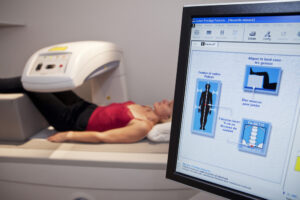Regular health screenings are essential for maintaining optimal health, and colon cancer screenings, mammograms, blood tests, and skin cancer screenings are all vital measures for preventing serious diseases or catching them at an early stage. As we age, a DEXA scan can provide valuable insight into our bone health. By undergoing a DEXA bone scan, you can obtain information that can help you prevent or manage osteoporosis. Discover the benefits of a DEXA bone scan and how it can contribute to your overall well-being.
What Is A DEXA Scan?
Remember when mom told you to eat all your fruits and vegetables, drink milk, and play a while in the sun every day? These were all good ways to build strong bones for life.
As we age we can lose strength and mineral density in our bones. A DEXA scan is a non-invasive test that measures bone density, the acronym standing for dual energy X-ray absorptiometry. Two X-rays are aimed at your bones to tell you if you might be at risk for osteoporosis or fractures. This test can detect changes in your bones as small as 1%, making it much more accurate than a simple X-ray which can only detect changes after you have lost 40%.
energy X-ray absorptiometry. Two X-rays are aimed at your bones to tell you if you might be at risk for osteoporosis or fractures. This test can detect changes in your bones as small as 1%, making it much more accurate than a simple X-ray which can only detect changes after you have lost 40%.
Since osteoporosis normally affects older women post-menopause, Southwest Diagnostic Imaging Center may recommend this test once you reach the age of 65 and have lost estrogen. If you have a higher risk, it may be recommended at age 60. Men should have at least one test once they reach age 70.
This painless and quick test will tell you specifically about the bone density of your spine, hips, and sometimes the forearm.
The Importance Of A DEXA Scan
After your initial DEXA bone scan, your healthcare provider may recommend follow-up scans to monitor changes in your bone density and progression of any bone-related conditions. These subsequent scans will help evaluate if there has been any loss or gain in your bone density. By comparing the results of each scan, your physician can determine if your bone density has decreased, increased, or remained stable over time.
The purpose of the scan include the following:
- If you suffer a fracture, it can tell you if it was due to osteoporosis
- To decide if medication is needed to slow the progression of osteoporosis
- If you have back pain that could be a problem with your spine
- If you have lost at least a half inch of height in a year
- If you have lost a total of an inch and a half of height
DEXA Results
Upon completion of your DEXA bone scan, you will be provided with a T-score report. A T-score of -1.0 or higher is considered normal, while a score between -1.0 and -2.5 indicates low bone density. If your T-score is -2.5 or lower, it is indicative of osteoporosis. Understanding your T-score is critical in assessing your bone health and guiding treatment options to prevent further bone loss or manage osteoporosis.
Maintain Your Bone Strength
Exercising regularly, eating healthy foods, taking Vitamin D supplements are all good ways to keep your bones strong and prevent fractures and osteoporosis.
Maintain your calcium intake, eat lots of salmon, green veggies like broccoli and spinach, and add weights to your exercise. Limit smoking and alcohol use.
Mom would be proud.
Schedule an Appointment for a DEXA Scan in Dallas, TX
Southwest Diagnostic Imaging Center offers comprehensive DEXA scan exams to test patient’s bone health in Dallas, TX. Contact Southwest Diagnostic Imaging Center at (214) 345-6905 if you would like to schedule your first or subsequent DEXA scan.

